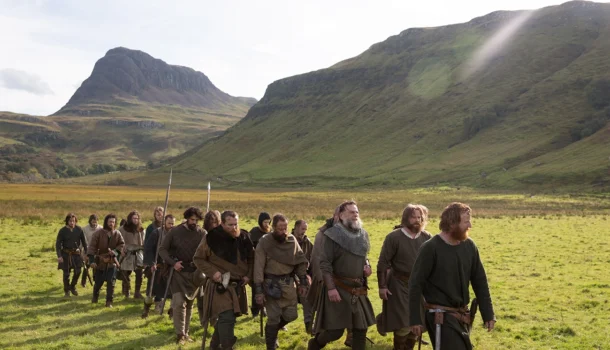David Mackenzie crafts a meticulously designed visual spectacle in “Outlaw King” opening the 2018 Toronto International Film Festival with striking technical precision. The director employs drones to capture the vastness of the Scottish landscapes, while the costumes are recreated with obsessive fidelity, reviving the aesthetics of the 14th century. The battle sequences, central pieces of the narrative, are executed with surgical precision, reflecting Mackenzie’s signature craftsmanship, transforming an obscure passage of Scottish history into an enthralling tale.
At the core of the story, ambition, moral downfall, collective consciousness, and the painful birth of a nation converge, bringing universal resonance to an episode that might otherwise seem distant. His talent in directing the cast enhances every scene, elevating the film to the level of a grand epic where seemingly ordinary events become essential fragments of the greater chronicle unfolding.
Chris Pine’s magnetic performance anchors Mackenzie’s exploration of fierce disputes, retracing the journey of Robert I (1274-1329), the monarch who inscribed his name in history by defying the English monarchy in the early 14th century. His portrayal reinforces the image of the paternalistic leader, an archetype of a ruler embodying the will of the people, foreshadowing traits that would later shape populist rhetoric worldwide.
Scotland at the time was a chessboard of geopolitical intrigues, a fragmented territory whose own inhabitants barely understood their collective identity. By claiming the throne and challenging English rule, Robert The Bruce thrusts the country into a cycle of conflicts that extends far beyond his victory, sowing resentments that span classes and generations. The apparent stability gives way to simmering tension, which the film skillfully portrays in a remarkable long take, highlighting the protagonist’s authoritarian and misogynistic tendencies without mythologizing him.
The central clash unfolds between Robert I and Edward I, Prince of Wales, played by Billy Howle, a rivalry that fuels the screenplay co-written by Mackenzie and four other writers. The narrative interplay allows the roles to shift, avoiding a simplistic dichotomy between heroes and villains. Both characters oscillate between virtues and flaws, guiding the audience through a journey of constant reinterpretation.
Ultimately, however, Robert The Bruce is positioned as the central figure of Scottish resistance, his journey shaped as that of an insurgent leader against an overwhelming empire. The film’s nationalist undertone becomes evident as it highlights the Scots’ cunning and resilience against a numerically and militarily superior adversary, drawing historical parallels to other Anglo-Scottish conflicts. In some ways, the film shares a perspective with David Michôd’s “The King” (2019), offering a lens on the geopolitical chess game of the era, albeit with different focal points.
The narrative structure does not stray from the age-old myth of the warrior defying a colossus, a formula repeated since biblical times and reimagined countless times in cinema. However, “Outlaw King” avoids mere escapism by rigorously examining the historical tensions between Scots and English, a rivalry deeply embedded in both nations’ collective memory. The film draws a historical thread that spans centuries, connecting Robert The Bruce’s feats to Mary Stuart’s rebellion against Elizabeth I, a theme revisited in “Mary Queen of Scots” (2018), directed by Josie Rourke. Three hundred years after the battles fought by the Scottish monarch, one of his descendants, James VI, ascends to the English throne, solidifying the unification of the realms. These are twists that only history, with its ironic sense of justice, can orchestrate.
On a deeper level, the film also touches on a critique of monarchies, which, beneath their pompous surface, share structural traits with modern autocratic regimes. Robert The Bruce experiences this firsthand, crowned king while his wife, Elizabeth de Burgh, is taken hostage by the enemy. Florence Pugh, with her usual emotional depth, imbues her character with poignant humanity, amplifying the protagonist’s anguish and reinforcing the realization that governing demands superhuman sacrifices. The film refrains from romanticizing royalty but exposes the complexities of those caught at the center of power.
The enduring fascination of audiences with such narratives suggests that, despite the passage of time, social and political structures maintain deep roots. The average viewer, even removed from the medieval context, finds parallels between those who shaped the fate of nations and the contemporary dilemmas that continue to steer history’s course. Seven centuries after Robert I’s rise, Scotland, now a constitutional democracy, still has a monarch as its head of state — Charles III, heir to a throne whose origins are lost in time. The irony of this inescapable cycle was brilliantly summed up by Giuseppe Tomasi di Lampedusa in “The Leopard”: some things change so that everything remains the same.
Film: Outlaw King
Director: David Mackenzie
Year: 2018
Genres: Action/Drama
Rating: 9/10

